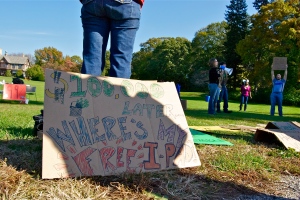Kathleen Joyce
 Starting on September 17th, the Occupy Wall Street movement took New York City by storm. As the weeks went by, other cities, towns, and schools around the country started to take notice. People from around the United States began to support and copy the movement. The media has taken notice, making Occupy Wall Street one of the hottest stories of the year. On Wednesday, November 2nd, students and faculty started their own solidarity movement on our campus called Occupy C.W. Post.
Starting on September 17th, the Occupy Wall Street movement took New York City by storm. As the weeks went by, other cities, towns, and schools around the country started to take notice. People from around the United States began to support and copy the movement. The media has taken notice, making Occupy Wall Street one of the hottest stories of the year. On Wednesday, November 2nd, students and faculty started their own solidarity movement on our campus called Occupy C.W. Post.
The purpose of the campus protest is to bring the Occupy Wall Street protest closer to home and to protest the way the school is run, including the tuition increases and how the money is being spent.
The November 2nd protest started with setting up the whole event on the Great Lawn by making signs out of cardboard. Students and faculty were encouraged to make signs. Throughout the day, students and teachers made speeches for the crowd. During the Common Hour, a march was assembled to go around the campus. The day continued with more faculty and student speakers, ending with a vigil for Scott Olsen, a former Marine who was shot in the head with a projectile object thrown by the police while participating in the Occupy Oakland protest on October 25th.
Students who were gathered at the event were mesmerized by the protests taking place. Junior criminal justice major Melinda Fuentes said,” It’s about time! The first awareness was with the faculty strike. If we keep going, the Provost will take notice of what the students here want.”
Sophomore chemistry major Jackie Wiswall said, “I totally agree; our tuition has been raised for no reason. We’re building a new football field, and we’re expected to pay for it? After college, I’m not guaranteed a job anyway, so I’m annoyed.”
Corey Sobel, a sociology graduate student, said he came down in support of some of his friends. “I hope people in charge realize [that] students are frustrated by the way the campus does not address issues; hopefully, things will change,” he said.
Corinna Grunn, a sophomore theater major, was involved with organizing the event. When asked by the Pioneer what she hoped the protest would accomplish, she said, “We want to get a budget breakdown and see exactly where our tuition money goes.”
Wendy Ryden, an English professor, took her class to see the Occupy Wall Street protest in New York City. They were some of the students who made speeches at last week’s campus event. Ryden wore a shirt in support of the protesters, which said “Got Thought” on the front and on the back said “Take Action”. When asked about her feelings towards the protest she said, “I’m excited that people at Post are interested enough to want to connect with global issues.”
Jennifer Rogers, a sociology professor and a speaker at the event said, “It’s powerful to see students, faculty, and staff united. We are the 99% ; we’re the ones taking pay cuts and tax rises. We need to analyze our roles as citizens and members of a community to enact change.”
Sociology professor Eric Lichten also spoke at the event and plans to write a book about the Occupy Wall Street movement. Lichten said, “What Occupy Wall Street represents is the cry of the few to take back America – to make America the land that it could be, by changing its future, by challenging the concentrations of wealth and income in the hands of the few. Occupy Wall Street is the reappearance of class consciousness among the public who call, with the dignity of their commitment, for social justice, for meeting the human needs of humanity, before it’s too late. These people represent the call to explore new ways to live together, as a community, instead of in a war of each against the other America for whom? America, it must be for you and me.”
Some students walked by the protest on the Great Lawn without a blinking eye. Some saw the event but didn’t know what it was for. Alexa Lacajnina, a junior early childhood education major, asked, “They’re protesting to lower the tuition?” When asked her thoughts on the assembly, she said, “I don’t think it’s going to do much, but it might start to do something.”.
For those who want to find out more about the Occupy Wall Street movement, any news site, such as the New York Times or CNN, can provide up to date information. The movement also has a Facebook page, www.facebook.com/OccupyWallSt and a website, http://occupywallst.org/ Any student interested in the Occupy Post group can visit its Facebook page,www.facebook.com/pages/Occupy-C-W-PostLIU/180906245325041 or talk to Professor Eric Lichten of the Sociology Department. Each day, these protestors are making progress by inspiring others to take their lead. A group of students and faculty at C.W. Post took notice, will you?






Be First to Comment